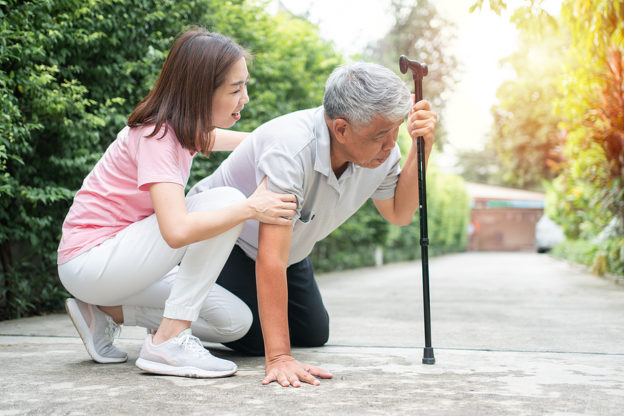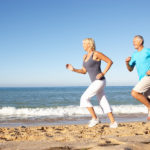By David Blyweiss, M.D., Advanced Natural Wellness
June 23, 2021
I’m sure you’ve noticed some huge changes in your body as the years go by. Your muscle mass actually began to decrease by 3-8% per decade after you turned 30. This rate speeds up even more after the age of 60.
There’s no doubt about it. As we humans grow older, we tend to lose muscle strength. The medical name for it is sarcopenia.
But what causes that loss?
Well, as we age, our muscles have a harder time synthesizing protein. So even if you’re eating enough protein – or more than enough – it won’t have the same affect it had on your muscle mass as it did when you were younger.
You don’t have the growth hormone you used to. Or the testosterone. As we age, we don’t eat as well, we don’t chew as well and we’re not hydrated as much. There are just so many reasons why we lose muscle.
Sadly, sarcopenia is a major reason why elderly people become disabled. This loss of muscle mass increases your risk of falls, fractures and hospitalization the same way a loss of bone density does. It adds to frailty in older people.
Open your arteries, improve blood flow for a new health miracle...
Did you know your circulatory system has over 60,000 miles of arteries, veins and other blood vessels, if stretched end to end?
But as you age, your blood vessels undergo changes, which may cause them to stiffen, thicken and get clogged.
GOOD NEWS! Doctors have now identified a “Miracle Molecule” inside your arteries that helps OPEN your arteries and IMPROVE blood flow.
It’s what Dr. Valentin Fuster calls it, "One of the most important discoveries in the history of cardiovascular medicine."To you, that means...
- Healthy blood pressure
- Sharper mind and memory
- Skyrocketing energy and muscular strength
- Increased pleasure and passion in the bedroom
- Improved circulation to every cell and organ in your body
Go here to discover a new natural way to significantly boost the levels of this miracle molecule in YOUR body NOW!
Unfortunately, the more muscle you lose, the less likely you are to participate in activities that require physical exertion. But physical exertion is exactly what your body needs to promote muscle mass!
174% Increase in Muscle Strength!
There is no better anecdote for sarcopenia than good old-fashioned exercise. Specifically, resistance exercise.
And 121 randomized controlled trials prove it. They all show that older people who participate in resistance training get stronger, walk and climb stairs better and are able to get up and down from their chair more quickly.
In fact, one of those studies involved people from 90 to 99 years of age. With just 8 weeks of high-intensity resistance training they increased their muscle strength by an astounding 174%, and their gait speed by 48%.
That’s amazing! They nearly double their strength in just two months!
Now our bodies were designed for movement. We walk, twist, bend, lift, climb, stand, push, jump and perform all sorts of physical tasks in our daily lives. This means it’s important to exercise every single part of your body on a regular basis.
Chair squats, wall push-ups, and supported lunge exercises are some of my favorite kinds of resistance exercise. They use your own body weight to engage muscles and boost muscle mass. Plus, they’re movements that strengthen the muscles your body uses every single day.
Are You Suffering From...
- Love handles and a pot belly
- Romance that isn't what it used to
- Forgetfulness and inattention
- Low (or no) strength and endurance
- A sex drive that's shifted into neutral...or worse
If so...you may have Mature Male Burnout. Click here to discover more about this unique condition and what you can do about it.
It only takes about a half-hour a day, three days a week to get your resistance training in. I recommend performing the activity for a count of 10 and then taking a short one-to-two-minute break. Then perform two more sets of ten with another break between them. As you gain strength, increase the count and reduce your break time.
On the days you don’t perform your resistance training, you should still take the time to go on a nice, long walk. And that’s not only advice for the fit and firm. Even if you’re overweight, using a cane or a walker you should still be participating. Just don’t stray too far from home, and don’t over-do it.
Don’t let your fears hold you back from achieving good health with exercise.
If you have any concerns at all don’t hesitate to talk to your doctor first. He will be the first to tell you that simple, easy exercises are crucial when it comes to your health.
Get Even Better Results
Low growth hormone (HGH) or testosterone are both reasons you will lose muscle with age. You just don’t have the hormones to keep it going, just like you don’t have as much collagen in your skin as you get older.
But you there are natural ways to boost your HGH levels. All you have to do is give your body the right amino acids.
You see, amino acids act as secretagogues – or precursors – that naturally stimulate your body’s production of HGH. They work by activating the pituitary gland so that it secretes more of this youth hormone. TheY work even better when combined with resistance exercise.
Look for a formula that contains L-Arginine, L-Glutamine and L-Ornithine, or buy them separately.
All these nutrients should be taken right before bedtime. And the reason is simple. Growth hormone is primarily secreted while you’re sleeping!
For a boost to stamina and endurance choose a product with ingredients like tongkat ali, zinc, chrysin and Tribulus terrestris.
It’s also a good idea to support your mitochondria, which will give your muscles more energy. CoQ10, magnesium, resveratrol and pterostilbine are great for this. D-ribose, alpha lipoic acid and the B vitamins also offer mitochondrial support.
If you add these supplements, do your exercises, drink your fluids and watch your diet, you’ll build more muscle and lose the fat.
SOURCES:
Volpi E, Nazemi R, Fujita S. Muscle tissue changes with aging. Curr Opin Clin Nutr Metab Care. 2004;7(4):405-410.
Liu C-j, Latham NK. Progressive resistance strength training for improving physical function in older adults. Cochrane Database of Systematic Reviews 2009, Issue 3. Art. No.: CD002759.
Fiatarone MA, Marks EC, Ryan ND, Meredith CN, Lipsitz LA, Evans WJ. High-intensity strength training in nonagenarians. Effects on skeletal muscle. JAMA. 1990 Jun 13;263(22):3029-34.
Collier SR, Collins E, Kanaley JA. Oral arginine attenuates the growth hormone response to resistance exercise. J Appl Physiol (1985). 2006 Sep;101(3):848-52.
Welbourne TC. Increased plasma bicarbonate and growth hormone after an oral glutamine load. American Journal of Clinical Nutrition. 1995;61:1058-1061.
Zajac A, et al. Arginine and ornithine supplementation increases growth hormone and insulin-like growth factor-1 serum levels after heavy-resistance exercise in strength-trained athletes. J Strength Cond Res. 2010 Apr;24(4):1082-90.







